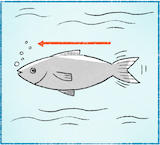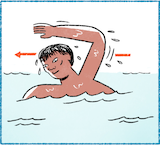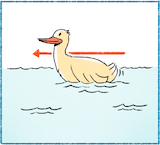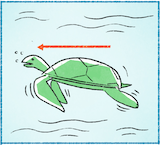



นี้คืออี่หยัง นี้คือปา ปาอยู่ในน้ำ ปาโตบักใหญ่หนึ่ง
ปามันกำลังเฮ็ดหญังอยู่ ปามันกำลังหว้ายน้ำอยู่ มันกำลังหว้ายน้ำอยู่ในน้ำ มันกำลังหว้ายไปข้างหน้าอยู่
อะวัยยะวะของปามีอี่หยังแน่ มีส่วนใดแน่อยู่ในโตล้างกายของปา กะสิมีคีบพ้อม มีเหงียกพ้อม มีปากพ้อม แล้วกะมีตา มีหาง แล้วกะมีลำโต บางโตกะมีเก็ดพ้อม บางโตกะบ่มีเก็ด
ปามันใซ้ซีวิดอยู่ใส ปามันใซ้ซีวิดอยู่ในน้ำแม่นบ่ แม่น ปามันใซ้ซีวิดอยู่ในน้ำ ขั้นมันอยู่เทิงบกมันกะสิตาย ขั้นมันอยู่ในน้ำมันจั่งสิมีซีวิด หลือมีซีวิดลอดนั้นหละ
12
เขากำลังเฮ็ดหญัง เขากำลังหว้ายน้ำอยู่ พุซายคนนี้เขากำลังหว้ายน้ำอยู่ เขาหว้ายน้ำอยู่ในน้ำ
จักเขาหว้ายอยู่ใส อาดสิหว้ายอยู่ในทะเล หลือหว้ายอยู่สะหว้ายน้ำกะได้
เขาหว้ายอยู่กับใผ พุซายคนนี้เขาหว้ายน้ำอยู่กับใผ เขาหว้ายพุเดียว เขาอยู่พุเดียวของเขา คือสิบ่มีหมู่ เขากะเลยหว้ายน้ำอยู่พุเดียว
13
นี้คืออี่หยัง นี้คือเป็ด
เป็ดมันกำลังเฮ็ดหญังอยู่ มันกำลังลอยน้ำอยู่ มันกำลังลอยน้ำอยู่ในน้ำ จักมันลอยน้ำอยู่สะใด ฮู้แต่ว่ามันกำลังลอยน้ำอยู่ในน้ำอยู่
เป็ดมันเป็นโตจั่งใด เป็ดมันโตค้ายๆ กับนก หลือค้ายๆ กับไก่นั้นหละ
ปากเป็ดมันกะสิเป็นเปๆ เป็นใหญ่ๆ ปากเป็ดมันเป็นสีส้ม บ่เป็นสีดำคือไก่
เป็ดบ่สามาดบินได้คือนก เป็ดสามาดบินได้หน่อยเดียว บินได้บ่สูงหลาย บินได้ต่ำ บินบ่ได้สูงคือนก
14
นี้คืออี่หยัง นี้คือเต่า
เต่ามันกำลังเฮ็ดหญังอยู่ เต่ามันกำลังหว้ายน้ำอยู่ มันกำลังหว้ายน้ำอยู่ในน้ำ มันหว้ายอยู่โตเดียวนั้นหละ มันใซ้ขาของมัน กำลังหว้ายน้ำอยู่ในน้ำอยู่
มันหว้ายน้ำอยู่ใส จักคือกัน จักว่ามันหว้ายน้ำอยู่ใส ฮู้แต่ว่ามันหว้ายอยู่ในน้ำนั้นหละ
มันหว้ายอยู่ใต้น้ำ หว้ายอยู่ใต้ๆ น้ำ หว้ายอยู่ลึกๆ เผี้ย บ่ได้หว้ายอยู่สูงหลาย
อะวัยยะวะของเต่าสิมีอี่หยังแน่ มันกะสิมีขาพ้อม มีสี่ขา เต่ากะสิมีหางพ้อม แล้วกะมีหัวพ้อม มีปาก มีตา คือๆ กันกับนก กับหญังนั้นหละ แต่ว่าเต่ามันสิแตกต่างจากโตอื่น เพาะว่ามันสิมีกะดองพ้อม มีกะดองอยู่เทิงหลังของมัน เอาไว้ถ้าหลบซ้อน หลือเสี่ยงโตของมัน เสี่ยงหัว เสี่ยงขาของมัน
ญามเกิดเหดล้ายใดๆ มันสิเข้าไปหลบซ้อน ไปเสี่ยงโตอยู่ในกะดองของมัน
เต่ามันเป็นสัดเคิ่งบกเคิ่งน้ำ มันสามาดอยู่ในน้ำกะได้ สามาดอยู่เทิงบกกะได้ มันบ่คือปา มันสามาดใซ้ซีวิดอยู่ในน้ำกะได้ ใซ้ซีวิดอยู่เทิงบกคือกันกับสัดโตอื่นกะได้
Link to overview page
Link to dictionary
| Isaan | Pronunciation | Tones | Thai | English/Notes |
|---|---|---|---|---|
| นี้ | ni: | HF | นี้ | 1. this 2. here |
| คือ | khʉ: | HR | คือ | 1. to be, to resemble, like, as 2. why {บักหล้าคือบ่เก็บโต่ะแน่ = [addressing a young boy] Why haven't you cleared the table?} |
| อี่หยัง | i:-yaŋ | H-M | อะไร | 1. what {นี้คืออี่หยัง = What is this?} {มื้อนี้เจ้าเฮ็ดอี่หยัง = What are you doing today?} {กินเข้างายกับอี่หยัง = What did you have for breakfast?} 2. something, anything, (in negations) nothing {บ่ต้องเฮ็ดอี่หยังอีกเลยนอกจากใส่ปุย = [we] don't need to do anything besides adding fertilizer} |
| ปา | pa: | M | ปลา | fish |
| อยู่ | yu: | H | อยู่ | 1. to be (located) at 2. yet, still 3. auxiliary indicating continuous or progressive action {ทอดปาอยู่ในกะทะ = (in the process of) frying a fish in the pan} {แม่กำลังเมี้ยนเฮียนอยู่ = mother is cleaning/tidying up the house} |
| ใน | nai | HR | ใน | in, within |
| น้ำ | na:m | HF | น้ำ | 1. water 2. drink, soft drink, juice |
| โต | to: | M | ตัว | 1. body, self 2. clf. for animals, characters/letters/consonants, appliances, clothes (e.g., pairs of trousers, shirts) |
| บัก | bak | M | 1. intensifier before adjectives {ปาโตบักใหญ่ = a (very) large fish} 2. prefix in front of fruits and vegetables {บักแตงโม = watermelon} 3. can be used as a reference for a male person of the same or younger age {บักอันนี้ = this lad} |
|
| ใหญ่ | ɲai | H | ใหญ่ | large, big |
| หนึ่ง | nʉŋ | H | หนึ่ง | 1. one 2. after adjective: intensifier {บักคักหนึ่ง = very much} {อันบักใหญ่หนึ่ง = very large}, or attenuates the meaning {กะดาดมันแผ่นน้อยๆ หนึ่ง = the piece of paper is [relatively] small} |
| มัน | man | HR | มัน | it (also used to refer to people) |
| กำลัง | gam-laŋ | M-HR | กำลัง | auxiliary indicating continuous or progressive action |
| เฮ็ด | het | H | ทำ | to do, to make |
| หญัง | ɲaŋ | M | อะไร, เป็นหญัง = ทำไม | 1. what {เขากำลังเฮ็ดหญัง = What is he doing?} {ธูปเอาไว้เฮ็ดหญัง = What are incense sticks for?} 2. something, anything, (nothing) 3. เป็นหญัง[...]คือ in initial position: why {เป็นหญังเขาคือใส่บักพิกลงไปในกวยเตียว = Why is he putting chili in [his] noodle soup?} {เป็นหญังหน้าต่างมันคือเปิด = Why is the window open?} {เป็นหญังมันคือมีควนไฟ = Why is there smoke?} |
| หว้ายน้ำ | wa:i-na:m | LF-HF | ว่ายน้ำ | to swim |
| หว้าย | wa:i | LF | ว่าย | to swim {หว้ายน้ำ = to swim} |
| ไป | pai | M | ไป | 1. to go 2. auxiliary indicating action extending into the future |
| ข้างหน้า | kha:ŋ-na: | LF-LF | ข้างหน้า | in front, forward |
| อะวัยยะวะ | a-wai-ya-wa | M-HR-M-H | อวัยวะ | organ, body part |
| ของ | khɔ:ŋ | M | ของ | of, belonging to |
| มี | mi: | HR | มี | 1. to have 2. there is |
| แน่ | nɛ: | H | แน่, บ้าง | 1. some, somewhat 2. final particle, used to ask for examples (similar to Thai บ้าง at the end of a question) {หม้อใซ้เฮ็ดอี่หยังได้แน่ = What (different things) can a pot be used for?} {น้ำอัดลมซื้อได้อยู่ใสแน่ = Where/in which places can one buy soft drinks?} 3. final particle, when giving examples {มีเทิงส้งแน่ มีเสี้ยแน่ มีเกิบแน่ = there are trousers, shirts, shoes etc.} 4. final particle, used to give a command {ไปปิดหน้าต่างให้แน่ = Close the window!} 5. final particle, acting as an intensifier, especially in the pattern ... คัก ... แน่ {สูงคักสูงแน่ = very high} {ญ้องเฮาคัก ญ้องเฮาแน่ = [he's] praising me a lot} |
| ส่วน | su:an | H | ส่วน | part, portion |
| ใด | dai | M | ใด | 1. which, that one which, what, how {เขานั่งแบบใด เขานั่งขดตะหมาดอยู่ = How is he sitting? He's sitting cross-legged.} {ตอนใด = when?} 2. whichever, whoever {หม้องใดหม้องหนึ่ง = some place, somewhere} {ขั้นเฮาอยากตื่นญามใด เฮากะตั้งเวลาปุกญามนั้น = If we want to get up at a certain time, we set the alarm to that time} Notes: sentence-final often with a marked rising tone |
| ล้างกาย | la:ŋ-ga:i | HF-M | ร่างกาย | body |
| กะ | ga | M | ก็ | 1. then, consequently 2. also |
| สิ | si | M | จะ | future tense auxiliary {เขากำลังสิตื่น = he's about to wake up} {สิไปตะหลาด = [I'm] going to the market} |
| คีบ | khi:p | HF | ครีบ | fin (of a fish) |
| พ้อม | phɔ:m | HF | พร้อม | at the same time, also, too {มีตะเว็นพ้อม = the sun's out, too} {กะทะมีด้ามพ้อม = the pan has also a handle} |
| เหงียก | ŋi:ak | LF | เหงือก | fish: gill |
| ปาก | pa:k | LF | ปาก | mouth |
| แล้ว | lɛ:o | HF | แล้ว | 1. finished 2. already 3. and then, and next (especially แล้วกะ) 4. auxiliary for past tense |
| ตา | ta: | M | ตา | eye {เขามีตาสองข้าง = he's got two eyes} {หลับตา = to close one's eyes} |
| หาง | ha:ŋ | M | หาง | tail |
| ลำโต | lam-to: | HR-M | ลำตัว | body |
| บาง | ba:ŋ | M | บาง | 1. some {สัดบางโตบ่มีขา = some animals don't have legs} {บางคนสิมักกินกวยเตียวแทนเข้า = some people like to eat noodle soup instead of rice (dishes)} {บางสิ่งบางอย่าง = something, anything} 2. thin |
| เก็ด | get | M | เกล็ด | fish: scale |
| บ่ | bɔ: | H | ไม่ | 1. no, not 2. question particle, transforming a statement into a question Notes: spelling exception in line with common usage on social media |
| ใซ้ซีวิด | sai-si:-wit | HF-HR-H | ใช้ชีวิต | to live, to spend one's life |
| ใส | sai | M | (ที่)ไหน | 1. where? {สิไปใส = Where are [you] going?} {มาแต่ใส = Where are [you] coming from?} {กะทะอยู่ใส = Where's the pan?} 2. somewhere, anywhere {ใสกะได้ = anywhere, wherever you like} |
| แม่นบ่ | mɛ:n-bɔ: | H-H | ใช่ไหม | question particle: ..., right? ..., isn't it? ..., don't you? etc. {เจ้าได้เห็นสิ่งนั้นแม่นบ่ = You've seen that, haven't you?} {ฝนกำลังตกแม่นบ่ = It's raining, isn't it?} {นี้คือกะคุแม่นบ่ = This is a bucket, isn't it?} |
| แม่น | mɛ:n | H | ใช่ | 1. yes 2. affirmative particle |
| ขั้น | khan | LF | เมื่อ | when, if |
| เทิง | thə:ŋ | HR | บน | 1. on, on top of, at, in {เทิงโต่ะ = at/on the table} {กบมันนั่งอยู่เทิงใบบัว = the frog is sitting on the lotus leaf} {เทิงท้องฟ้า = in the sky} {มันแล่นอยู่เทิงลาง = [the train] runs on rails} {มีคนนั่งอยู่เทิงลดสามล้อสามคน = there are three people sitting in the tuk tuk} 2. up, upward Notes: pronunciation: also realized as ทัง |
| บก | bok | M | บก | land, dry land, ashore |
| ตาย | ta:i | M | ตาย | to die |
| จั่ง | jaŋ | H | ค่อย (?) | then, afterwards {ต้องใซ้น้ำมันพ้อม มันจั่งสิทอดได้ = one needs to use oil as well, then one can fry [food]} |
| ซีวิด | si:-wit | HR-H | ชีวิต | life Notes: also pronounced ชีวิด [chi:-wit] |
| หลือ | lʉ: | M | หรือ | or |
| ลอด | lɔ:t | HF | รอด | to survive |
| นั้นหละ | nan-la | HF-M | นั่นแหละ | auxiliary for emphasis at the end of a phrase |
| เขา | khao | M | เขา | personal pronoun: he, she |
| พุซาย | phu-sa:i | H-HR | ผู้ชาย | man, male |
| คน | khon | HR | คน | person, people |
| จัก | jak | M | จัก | 1. answer to a question: [I] don't know, don't know exactly, [I'm] not sure {พุซายคนนี้เขาเถ้าไป่ จัก จักเถ้าหลือบ่เถ้า เบิ่งบ่ค่อยออก = Is this man here already old? I don't know. I can't see clearly whether he's old or not.} {เขาเว้ากันอยู่ใส จักคือกัน = Where are they talking? I don't know either.} 2. exact(ly), what exactly {จักต้มอี่หยังกะบ่ฮู้ = I don't know what (exactly) he is cooking} {บ่ลู้คือกันจักปาอี่หยัง = I don't know either what kind of fish this is} 3. how much/many? {ต้นไม้มีจักต้น = How many trees are there?} {ตอนนี้จักโมงแล้ว = What time is it now?} {มือของเฮานี้สิมีจักนิ้ว = How many fingers do our hands have?} 4. a bit, a little bit {จักหน่อย/จักหน่อยหนึ่ง = a bit, a little bit} |
| อาด | a:t | LF | อาจ | 1. might, may, will 2. likely |
| ทะเล | tha-le: | H-HR | ทะเล | sea |
| สะหว้ายน้ำ | sa-wa:i-na:m | M-LF-HF | สระว่ายน้ำ | swimming pool |
| ได้ | dai | HF | ได้ | 1. can 2. to get, to obtain 3. before verb: indicating past tense 4. บ่ได้ + verb: not |
| กับ | gap | M | กับ | 1. and {ลุงกับป้า = uncle and aunt} {กวยเตียวหมูกับกวยเตียวไก่ = noodle soup with pork and noodle soup with chicken} 2. with, to {ค้ายๆ กับคำว่า ... = similar to the word ...} 3. prefix in front of foods {กับเข้า = side dishes eaten with rice} {เขากินกับกวยเตียว = he's eating noodle soup} |
| ใผ | phai | M | ใคร | 1. who {พุซายคนนี้เป็นใผ = Who's this boy?} 2. somebody, someone, anybody, with negative: nobody {บ่มีใผอยู่หนี้จักคนเลย = there's not a single person here} |
| พุเดียว | phu-di:ao | H-M | คนเดียว | 1. alone, by oneself {เขากำลังยืนอยู่พุเดียว = she's standing by herself} {เขานั่งอยู่พุเดียว = he's sitting by himself} 2. one person |
| หมู่ | mu: | H | หมู่, กลุ่ม(เพื่อน) | 1. group, friend(s) 2. children (in a family) {ลูกคนที่ออกมาก่อนหมู่ = the first-born child} {น้องสุดหมู่ = last-born child} 3. collective noun: group, many |
| เลย | lə:i | HR | เลย | 1. futher on, beyond, past {เข็มน้อยเลยเลขสิบสองไป = the minute hand has passed number twelve} 2. too much 3. at all 4. definitively 5. completely, utterly |
| เป็ด | pet | M | เป็ด | duck |
| ลอย | lɔ:i | HR | ลอย | 1. to float, to swim 2. to soar 3. smoke/steam: to rise |
| สะ | sa | M | สระ | pool Notes: see also สะหว้ายน้ำ |
| ฮู้ | hu: | HF | รู้ | 1. to know 2. to understand Notes: equivalent to ลู้ |
| แต่ว่า | tɛ:-wa: | H-H | แต่ว่า | 1. but 2. only {ฮู้แต่ว่าเขายืนอยู่พุเดียว = I only know that he's standing there by himself} |
| เป็น | pen | M | เป็น | 1. to be, to exist 2. to be able to 3. to suffer, sth. happens to 4. เป็นหญัง[...]คือ in initial position: why? {เป็นหญังเขากะคือแปงฟัน = Why is he brushing his teeth?} {เป็นหญังเคี่ยงบินมันคือสิตก = Why is the airplane falling down?} |
| จั่งใด | jaŋ-dai | H-M | ยังไง, แบบไหน | how, in what manner {บักนาวมันมีลดซาดจั่งใด = Lime fruits have what kind of taste?} {เขาปิดแอจั่งใด = How is he switching off the A/C?} {เทียนใซ้จั่งใด = How's a candle used?} {สิใซ้จั่งใด = how is [it] used?} |
| ค้าย | kha:i | HF | คล้าย | to resemble, to be similar, to be alike {ทัพพีเป็นค้ายๆ กับซ้อน = a ladle is similar to a spoon} |
| นก | nok | H | นก | bird |
| ไก่ | gai | H | ไก่ | chicken |
| เป | pe: | M | แบน, เรียบ | flat {ปากเป็ดมันสิเป็นเปๆ = the beak of the duck is flat} |
| สี | si: | M | สี | 1. color 2. colored pencil, crayon |
| ส้ม | som | LF | ส้ม | 1. fruit: orange 2. color: orange |
| ดำ | dam | M | ดำ | 1. black 2. to transplant rice seedlings {ดำนา = to transplant rice seedlings} |
| สามาด | sa:-ma:t | M-HF | สามารถ | can, to be able |
| บิน | bin | M | บิน | to fly |
| หน่อยเดียว | nɔ:i-di:ao | H-M | นิดหน่อย | a bit, a little bit, not much Notes: see also หน่อยหนึ่ง |
| สูง | su:ŋ | M | สูง | high, tall |
| หลาย | la:i | M | เยอะ, มาก | many, much, very |
| ต่ำ | tam | H | ต่ำ | low |
| เต่า | tao | H | เต่า | turtle |
| เดียว | di:ao | M | เดียว | only, alone, single |
| ใซ้ | sai | HF | ใช้ | to use |
| ขา | kha: | M | ขา | leg {ขาหน้า = front leg} {ขาหลัง = hind leg} {ส้งขาญาว = long trousers} |
| คือกัน | khʉ:-gan | HR-M | เหมือนกัน | 1. also, likewise, similarly {ยินดีที่ได้ฮู้จักคือกันคับ = Nice to meet you too!} 2. in negative sentences: either {บ่ลู้คือกัน = I don't know either} {จักคือกัน = I don't know (either)} |
| ว่า | wa: | H | ว่า | 1. that, as {คำว่า X = the word X} 2. to say |
| ใต้ | tai | HF | ใต้ | under, beneath, below |
| ลึก | lʉk | H | ลึก | deep |
| เผี้ย | phi:a | LF | นี่แหละ, อยู่นี้ | auxiliary for emphasis at the end of a phrase |
| สี่ | si: | H | สี่ | four |
| หัว | hu:a | M | หัว | 1. head 2. clf. for onions, bulbs of garlic |
| กัน | gan | M | กัน | mutual, each other, with another, together {เขากำลังนั่งเว้ากัน = they're sitting and talking} {เขาสองคนฮักกัน = they love each other} {ปาสองโตนี้ ใหญ่ห่างกันหลายบ่ = These two fish here, are they very different in size (from each other)?} {ต่างกัน = to be different (from each other)} {ก่องอันไหนหนักกว่ากัน = Which box is heavier (than the other(s))?} |
| แตกต่าง | tɛ:k-ta:ŋ | LF-H | แตกต่าง | different, dissimilar |
| จาก | ja:k | LF | จาก | 1. from {... เฮ็ดมาจากอี่หยัง = ... is made from what?} 2. to depart |
| อื่น | ʉ:n | H | อื่น | other |
| เพาะว่า | phɔ-wa: | H-H | เพราะว่า | because |
| กะดอง | ga-dɔ:ŋ | M-M | กระดอง | shell of a turtle |
| หลัง | laŋ | M | หลัง | 1. back, after 2. back (of body) {ขี่หลังควย = to ride on a water buffalo} 3. clf. for houses {บ้านหลังใหญ่ = a large house} {เฮียนไม้หลังเก่า = an old wooden house} |
| เอา | ao | M | เอา | to take, to give {เขากำลังเอาก่องไปซั่ง = he's taking the boxes to weigh them} {หมอกำลังเอายาให้คนป่วยกิน = the doctor is giving medicine to the patient} {เอาไว้ถ้า = is for, is used for, has the purpose of} |
| ไว้ถ้า | wai-tha: | HF-LF | usually in a positive statement or answer: is for, is used for, has the purpose of {กะทะมีไว้ถ้าทอด = a pan is for frying} {น้ำบักนาวมีไว้ถ้าปุงอาหาน = lime juice is used to season food} {ปากกามีไว้ถ้าเขียน = a pen is for writing} {กะเทียมเอาไว้ถ้าเฮ็ดแนวกิน = garlic is used to make food} {ขาเอาไว้ถ้าญ่าง = legs are for walking} {เกิบเอาไว้ถ้าใส่ = shoes are for wearing} Notes: see also ไว้ |
|
| หลบซ้อน | lop-sɔn | M-HF | หลบซ่อน | to hide |
| เสี่ยง | si:aŋ | H | หลบ, หลบซ่อน | to hide from danger |
| ญาม | ɲa:m | HR | ยาม | 1. period of time {ญามมื้อเซ้า = morning} {ญามเที่ยง = noon} 2. when, while {ญามทอด ต้องใซ้น้ำมันพ้อม = one needs to use oil when frying} {ญามสิออกไปข้างนอกกะต้องใส่เกิบ = when one goes out, ones has to wear shoes} |
| เกิด | gə:t | LF | เกิด | 1. (often together with ขึ้น) to happen, to arise, to take place {เกิดอี่หยังขึ้น = what is happening?} {บ่มีหญังเกิดขึ้น = nothing's happening} 2. to be born 3. to grow {หนวดกะคือสิเกิดอยู่ใต้ดัง = a moustache grows below the nose} |
| เหดล้าย | he:t-la:i | LF-HF | เหตุร้าย | accident, misfortune, disaster |
| เข้า | khao | LF | เข้า | to enter, to go inside, to come/go in/on {เข้าห้องน้ำ = to go to the bathroom} {เข้านอน = to go to bed} {ขี่เลียเข้าไปเกาะ = to take a boat to go on an island} |
| สัดเคิ่งบกเคิ่งน้ำ | sat-khəŋ-bok-khəŋ-na:m | M-H-M-H-HF | สัตว์สะเทินน้ำสะเทินบก | amphibian |
| สัด | sat | M | สัตว์ | animal |